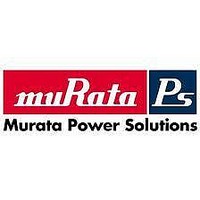ADS-929MM Murata Power Solutions Inc, ADS-929MM Datasheet - Page 3

ADS-929MM
Manufacturer Part Number
ADS-929MM
Description
Analog To Digital Converter
Manufacturer
Murata Power Solutions Inc
TECHNICAL NOTES
1. Obtaining fully specified performance from the ADS-929
Internal Reference
External Current
Logic Levels
Delay, Falling Edge of EOC
Output Coding
Power Supply Ranges
Power Supply Currents
Power Dissipation
Power Supply Rejection
POWER REQUIREMENTS, ±12V
Power Supply Ranges
Power Supply Currents
Power Dissipation
Power Supply Rejection
ANALOG OUTPUT
DIGITAL OUTPUTS
POWER REQUIREMENTS, ±15V
Footnotes:
requires careful attention to pc-card layout and power
supply decoupling. The device's analog and digital ground
systems are connected to each other internally. For
optimal performance, tie all ground pins (14, 19 and 23)
directly to a large analog ground plane beneath the
package.
Bypass all power supplies, as well as the REFERENCE
OUTPUT (pin 21), to ground with 4.7µF tantalum capaci-
tors in parallel with 0.1µF ceramic capacitors. Locate the
bypass capacitors as close to the unit as possible. If the
user-installed offset and gain adjusting circuit shown in
Figure 2 is used, also locate it as close to the ADS-929 as
possible.
Voltage
Drift
Logic "1"
Logic "0"
Logic Loading "1"
Logic Loading "0"
to Output Data Valid
+15V Supply
–15V Supply
+5V Supply
+15V Supply
–15V Supply
+5V Supply
+12V Supply
–12V Supply
+5V Supply
+12V Supply
–12V Supply
+5V Supply
®
All power supplies must be on before applying a start convert pulse. All supplies
and the clock (START CONVERT) must be present during warmup periods. The
device must be continuously converting during this time. There is a slight
degradation in performance when using ±12V supplies.
See Ordering Information for 0 to +10V input range. Contact DATEL for availability
of other input voltage ranges.
A 2MHz clock with a 200ns wide start convert pulse is used for all production
testing. See Timing Diagram for more details.
®
+9.95
+14.5
–14.5
+4.75
+11.5
–11.5
+4.75
MIN.
+2.4
—
—
—
—
—
—
—
—
—
—
—
—
—
—
—
—
+25°C
+10.0
+15.0
–15.0
+12.0
–12.0
TYP.
+5.0
+5.0
+45
–43
+80
+45
–43
+80
1.7
1.4
±5
—
—
—
—
—
—
—
—
+10.05
MAX.
+15.5
+5.25
±0.01
+12.5
+5.25
±0.01
–15.5
–12.5
+0.4
+55
–50
+90
+55
–50
+90
1.5
1.9
1.6
—
—
–4
+4
35
3
+9.95
+14.5
–14.5
+4.75
+11.5
–11.5
+4.75
+2.4
MIN.
—
—
—
—
—
—
—
—
—
—
—
—
—
—
—
—
2. The ADS-929 achieves its specified accuracies without the
3. When operating the ADS-929 from ±12V supplies, do not
4. Applying a start convert pulse while a conversion is in
Effective bits is equal to:
This is the time required before the A/D output data is valid after the analog input
is back within the specified range.
need for external calibration. If required, the device's small
initial offset and gain errors can be reduced to zero using
the input circuit of Figure 2. When using this circuit, or any
similar offset and gain-calibration hardware, make adjust-
ments following warmup. To avoid interaction, always adjust
offset before gain.
drive external circuitry with the REFERENCE OUTPUT. The
reference's accuracy and drift specifications may not be
met, and loading the circuit may cause accuracy errors
within the converter.
progress (EOC = logic "1") initiates a new and inaccurate
conversion cycle. Data for the interrupted and subsequent
conversions will be invalid.
0 to +70°C
+10.0
+15.0
–15.0
+12.0
–12.0
TYP.
+5.0
+5.0
+45
–43
+80
+45
–43
+80
1.7
1.4
±5
—
—
—
—
—
—
—
—
Offset Binary
(SNR + Distortion) – 1.76 +
+10.05
MAX.
+15.5
–15.5
+5.25
±0.01
+12.5
–12.5
+5.25
±0.01
+0.4
+55
–50
+90
+55
–50
+90
1.5
1.9
1.6
–4
+4
35
—
—
+9.95
+14.5
+4.75
+11.5
+4.75
–14.5
–11.5
+2.4
MIN.
—
—
—
—
—
—
—
—
—
—
—
—
—
—
—
—
–55 to +125°C
6.02
20 log
+10.0
+15.0
–15.0
+12.0
–12.0
TYP.
+5.0
+5.0
+45
–43
+80
+45
–43
+80
1.7
1.4
±5
—
—
—
—
—
—
—
—
Actual Input Amplitude
Full Scale Amplitude
+10.05
+15.5
+5.25
±0.01
+12.5
+5.25
±0.01
–15.5
–12.5
+0.4
+55
–50
+90
+55
–50
+90
MAX.
1.5
1.9
1.6
ADS-929
—
—
–4
+4
35
%FSR/%V
%FSR/%V
ppm/°C
UNITS
Watts
Watts
Volts
Volts
Volts
Volts
Volts
Volts
Volts
Volts
Volts
mA
mA
mA
mA
mA
mA
mA
mA
mA
ns








